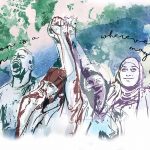‘To develop Africa, break with capitalism’
Walter Rodney examined the economics of colonialism and showed the profound connections between racial inequality and social injustice. Today, his ideas are as compelling as ever.
Author:
26 April 2019

Guyanese historian, academic and political activist Walter Rodney was assassinated in 1980 at the age of 38. Yet almost 40 years after his death, Rodney’s How Europe Underdeveloped Africa remains as relevant as when published: a call to arms in the class struggle for racial equality.
This is an edited version of The persisting relevance of Walter Rodney’s ‘How Europe Underdeveloped Africa.
That Walter Rodney’s How Europe Underdeveloped Africa still reads cogently after almost 50 years has more to do with how little things have changed rather than with any prophetic quality of the text or its author. If anything, it shows how resilient (neo)colonialism has proved to be as well as how fundamentally untouched its economic edifice remains.
The apparent paradox whereby the richest continent on earth (in natural resources) is also the poorest hasn’t lost any of its bitter irony. Africa is at the very centre of global economic interests, with major powers still scrambling over its highly lucrative resources. Though stereotypically perceived as the quintessential recipient of humanitarian aid, Africa still is, for the most part, being deprived of (its own) wealth rather than benefiting from charitable, outside help.
Related article:
If one wants to trace the genesis of this historical theft, often associated with or mistaken for “civilisation,” Rodney’s text is as indispensable as it is exhaustive. From the outset, the Guyanese historian, revolutionary, and academic disallows any moralistic understanding of colonialism, resolutely moving beyond accusation and guilt. While the dominant discourse around postcolonial reparations tends to be conducted in strict ethical terms, Rodney’s work compellingly links racial inequality with social injustice. It is the economics of colonialism he is after, not its morals or clear lack thereof.
Even when tackling the ancillary apparatuses of colonial rule such as culture and education, the relation between white supremacy and the exploitation of resources is always brought to the fore. So much so that Rodney concludes that “African development is possible only on the basis of a radical break with the international capitalist system.” The ultimate responsibility for the emancipatory struggle falls on the shoulders of Africans, he thought, implicitly warning that the benevolence or philanthropic charity of (post)colonial powers will never be a solution. As AM Babu notes in the postscript of How Europe Underdeveloped Africa: “[F]oreign investment is the cause, and not a solution, to our economic backwardness.”
Defining development and underdevelopment
What constitutes development, and, conversely, what exactly do we mean by underdevelopment? This is the question Rodney feels compelled to answer before venturing further in his militant diagnosis of Africa’s ills. He stresses how development should not be seen merely as an economic phenomenon but rather as an overall social process shaping and being shaped by the way societies came to be ideologically structured. Most crucially, “underdevelopment is not absence of development” the author notes. If anything it’s a by-product of it, its (in)direct consequence. There cannot be development, that is, the accumulation of wealth and expertise derived from the exploitation of natural resources and human labour, without its flip side — underdevelopment. The latter therefore denotes a relationship of exploitation, of one country by another in the colonial case, or one class over another in any case.
The two phenomena are by no means natural or dependent on the superior ingenuity of one particular people or race. Development and underdevelopment are politically determined; at the heart of their correlation we inevitably find exploitation. It would otherwise be difficult to explain why some of the poorest nations in terms of natural resources are among the richest on earth; their wealth was derived from the violent appropriation of other countries’ wealth.
By re-positing economic exploitation at the centre of his analysis, Rodney is able to comprehend and examine the persistence of the colonial paradigm and its racist superstructure. “Under colonialism, the ownership was complete and backed by military domination. Today, in many African countries the foreign ownership is still present, although the armies and flags of foreign powers have been removed.” Foreign aid and loans were in fact already replacing military coercion in the ever-evolving and innovating business of colonial theft.
Slavery as ‘foundational moment’
The structural dependency that came to characterise the political and economic relation between Africa and Europe is to be traced back to a foundational moment for the modern history of the African continent: slavery. All the premises that still determine the current predicament of most African countries were laid out in the genocidal days of the slave trade. It was then that the cultural and social traditions of basically an entire continent were extirpated, its population subjected to a mass dislocation, the likes of which humanity had never seen before nor has it experienced since.
Once again Rodney insists on linking the brutality of slavery to its financial rationale by quoting the English commercial expert Malachy Postlethwayt, who in 1745 enthused, “British trade is a magnificent superstructure […] on an African foundation.” The comparative analysis of How Europe Underdeveloped Africa does not exclusively focus on its titular assumption, but on its reverse deduction too. Slavery was in fact the engine of industrialisation and as a matter of consequence the very basis of Western development and global supremacy. Without the stolen gold from Africa, Amsterdam would have never emerged as the financial capital of Europe at the time; and when in 1663 the English named their new coin “Guinea,” it was not by coincidence. The very poles of the Industrial Revolution, like Liverpool for instance, “depended first of all on the growth of its port through slave trading”.
Related article:
Racism in Rodney’s analysis cannot be separated from the divisions created by the dominant economic system, which doesn’t mean that white supremacy did not evolve into its own cultural pathology. But to try solve racism, according to Rodney, without looking at its economic purpose is delusional at best. “[N]o people can enslave another for centuries without coming out with a notion of superiority,” the author observes, “white racism […] was an integral part of the capitalist mode of production.” This is a distinctive clarification that the book argues throughout, pointing out that “it is mistakenly held that Europeans enslaved Africans for racist reasons. European planters and miners enslaved Africans for economic reasons.”
The slave trade established a ruthless divide that came to define the historical chances Europe and Africa were given. The social and cultural advancements that European societies granted themselves are inseparable from the barbarity inflicted through slavery on African societies; it’s an irreconcilable contradiction Europe still refuses to face. It is indeed just a myth that attributes to colonial powers a civilising result, in spite of their so-called mistakes. “The most convincing evidence as to the superficiality of the talk about colonialism having ‘modernised’ Africa is the fact that the vast majority of Africans went into colonialism with a hoe and came out with a hoe.”
Monopoly capital seizes Africa
Rodney notes that while impossible to calculate, the impact of the slave trade first, and colonialism after, virtually deprived Africa of any developmental opportunity, condemning it to a subsidiary role. The continent and its resources had to be sacrificed on the altar of European expansionism and its priced economic growth. Material disparity obviously led to political, cultural, and, most crucially, educational inequality. Furthermore, while Western economists theorised the free market and its legendary advantages, in Africa capitalism bypassed democracy and went straight to its monopolistic stage with no institutional obstacles.
Europe cultivated its freedoms, human rights, and cultures, while its colonies were saddled with violence, exploitation, and misery. Gigantic monopolies emerged as a result of the unregulated brutality of colonial capitalism: Unilever, Crédit Lyonnais, Cadbury, Barclays, Procter & Gamble, Lloyds, Société Générale, De Beers, and many others all had a slice of the African pie (the author dedicates a whole case study to Unilever as a “Major Beneficiary of African Exploitation”).
Related article:
The continent that barely survived the European conquest was one deprived of subjectivity, both cultural and political. “Colonialism determined that Africans were no more makers of history than were the beetles — objects to be looked at under a microscope and examined for unusual features.” The “characteristics” still stereotypically associated with Africans are not of their own making. Tribalism, for instance, commonly assumed to be an atavist feature of “primitive” societies, is a preeminently modern phenomenon, the strategic result of divide and rule which Europe methodically applied in all its colonies. “[C]olonial powers sometimes saw the value of stimulating the internal tribal jealousies […] so that the march towards broader African national and class solidarities could be stopped and turned back,” Rodney points out.
And as Angela Davis notes in her foreword to the volume, even gender relations suffered an involution as a direct result of colonialism. Thus, the devastated image of Africa and its inhabitants, infants with a transparent rib cage, bloated stomach, and supplicant eyes became the iconography of choice for the profitable charity business. Rodney cites the example of a poster from Oxfam to explain how humanitarian entrepreneurship occluded the root causes of poverty to emotionally blackmail its backers. Far from being a solution to the poverty wreaked upon Africa by colonialism, charity represented its continuation by different means.
Theory as weapon
Unsurprisingly, the answer to the plight of Africa came from Africans, not from benevolent, guilt-stricken Europeans. It’s in the cracks of this brutal system that sedition and subversion seeped in to challenge colonial administrations and their armies: “The educated played a role in African independence struggles far out of proportion to their numbers, because they took it upon themselves and were called upon to articulate the interests of all Africans.”
What Amílcar Cabral called “the weapon of theory” turned out to be a crucial asset in the anti-colonial struggle, systematically denounced by the West as the ultimate manifestation of Africans’ barbarity. Though militarily victorious on most fronts, anti-colonialism could not shake off the more insidious chains of economic dependency on which neocolonialism still thrives. The pitfalls of national consciousness against which Frantz Fanon had warned may have contributed to the many difficulties that faced newly independent nations, but it is worth remembering that “in the 1940s and 1950s it was common to have strikes that were specifically connected with the struggle for independence”. Anti-colonialism, in other words, was never an exclusively nationalist endeavour.
While national independence was easier for postcolonial powers to circumvent, the class struggle remained their nightmare, and any African leader who put it on his agenda was immediately taken out — from Patrice Lumumba to Thomas Sankara. Even apartheid’s end in South Africa was stipulated on the fatal compromise whereby gold and diamond mines were not nationalised (as Mandela’s African National Congress had demanded) as a concession to the white ruling class that owned them. The failure to achieve social justice resulted in a deeply polarised country where, aside from a small black bourgeoisie, class and racial divisions still run deep into South African society. It is precisely in this regard that Rodney’s analysis remains as relevant as it was when first published — a call to arms in the class struggle for racial equality.
Giovanni Vimercati is currently completing a master’s in Media Studies at the American University of Beirut.
New Frame has received special permission from the Los Angeles Review of Books to republish this article. Any republication will require that further permission is sought and received from the Los Angeles Review of Books.



